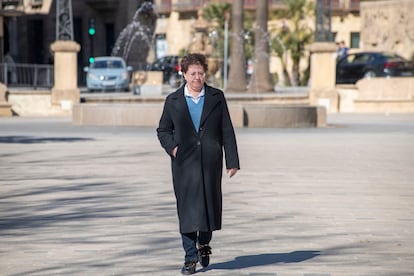Rays of hope in Spain’s suicide capital: ‘Now I see the sun coming out’
Alcalá la Real in Jaén, Andalucía, is seeking to make mental illness more visible and to reduce social stigma surrounding the issue


“Now I see the sun coming out; people should know that you can get out of this, it takes a lot of work, but you can get through it.” Antonia Gutiérrez Nieto, 50 years old, is walking through Alcalá la Real, a town of just over 20,000 inhabitants in Jaén, southern Spain, with a sense of serenity and inner peace that she has rarely been able to enjoy during her life. Four years ago, she attempted to take her own life with an overdose, the most recent and last of her recurrent suicide attempts, but her resilience has led her out of the tunnel she entered for the first time when she was 18 years old, by trying to force the car her father was driving off the road.
Toñi, as her neighbors call her, is overcome with emotion when she thinks of all the families in Alcalá la Real who have been affected by depression and suicide. “There is no consolation for them, but I also think they should see it as an opportunity to try to get out of the hole,” she says, adding that the best way to confront the disease is to “give it visibility and stop seeing it as a taboo or something to be ashamed of.” Toñi wants to lead by example and she now spends part of her time talking about her experiences and volunteering advice to those who come to her for help.
With a suicide rate of 21 per 100,000 inhabitants, Alcalá la Real leads this grim table in Spain with an incidence of almost three times higher than the national average (8.45) and the worldwide average of nine set by the World Health Organization. “It is very painful and residents carry a sense of shame with them, and that ends up stigmatizing the population,” says the town’s mayor, Antonio Marino Aguilera, whose family has also been touched by the issue.
In 2021, 11 people per day took their own lives in Spain, a total of 4,003 deaths according to data from a study of suicides in Spain between 2000 and 2021 carried out by researchers from Madrid’s Complutense University, the Center for Biomedical Research in Mental Health and Barcelona’s Hospital del Mar. The study revealed that more than half of Spain’s 50 provinces have above-average suicide rates, with Lugo, Zamora and Jaén the worst affected.

Statistics show that there have been 300 suicides in the last three decades in Alcalá la Real, the most recent of which was that of Javi, 18, on Christmas Eve. It is rare to find anyone in the town who does not know someone who has been affected by this silent scourge. Toñi’s ordeal began in childhood: “I lived in fear of my father and suffered from low self-esteem, something that was eroding my mental state.” Although she escaped from her family hell, her situation didn’t improve when she got married. “I couldn’t keep my head above water because I had no emotional stability,” she says. She separated from her husband and at the age of 23 she was diagnosed with ulcerative colitis, which forced her to stop working.
“I don’t know whether it was my mind or my body that made me sick first,” says Toñi, who was born in Alcalá la Real. She says she was 33 when she told herself she had reached the point of no return. Recurrent attempts to end her life in every possible way followed, interspersed with several hospitalizations for mental health issues, a period of her life that only ended four years ago. “It takes a lot of motivation to get out of this, and also family help,” says Toñi, who has the support of her daughter and two granddaughters on whom to rely.
Alcalá la Real is at the tip head of a cursed triangle that extends to other towns in the southern highlands of Jaén and municipalities in southern Córdoba, which share a common profile of mountainous terrain and geographical dispersion, something that has traditionally led to isolation and hindered social relations. “Adverse social factors do influence mental health and generate psychopathologies, but there are other causes that can lead to this situation,” says psychiatrist Ventura Olea Peralta, director of the Mental Health Unit at the University Hospital of Jaén. Social endogamy and the contagion effect are two other factors that have historically been linked to the high suicide rate in mountain ranges of Jaén, Granada and Córdoba. However, Peralta refutes the thesis of contagion: “Faced with a problem of this magnitude, it is necessary to talk, to give positive information, and at the same time establish prevention strategies for people suffering from depression.”
The Alcalá la Real authorities are planning a strategy to confront the problem. “If a tragedy is normalized by silence, in the end the problem becomes even more entrenched,” says Aguilera, who is initiating a campaign to fill the town with posters carrying positive messages alluding to depression and mental health. In addition, the municipality has just joined the European Alliance Against Depression (EAAD), a project that was set up in 2004 in Nuremberg and which aims to destigmatize the social concept and of the illness and prevent suicidal behavior.
Benedicto Crespo, an Alcalá la Real native and professor of psychiatry at the University of Seville, explains that the EAAD aims to foster direct relationships between primary care specialists and the different social groups involved in improving the detection and treatment of depressive pathologies, such as pharmacists, social workers, local police and other volunteers.
Experts agree on the need to reinforce primary care: 20% of people who have experienced suicidal episodes approach primary care services in the days leading up to them. Toñi knows this only too well, saying that she paid several visits to specialists’ offices before being taken seriously. “At first they thought I wanted to draw attention to myself,” she says, stressing the need to address these issues at their origins: “You don’t get to that stage without a fuse to ignite it.”
The genetic and hereditary component is another factor that is being explored to explain the high suicide rate in these regions of southern Spain. In the village of La Rábita in Jaén, 10 people from the same family, from three different generations, took their own lives. In the neighboring town of Priego de Córdoba, something similar is happening. “In the neighborhood where I grew up, I remember six suicides: an older couple, the father and sister of a friend, another acquaintance I met while walking the dogs and, a year ago, sadly, the 12-year-old son of some good friends,” says Manuel Molina, a teacher at a high school in the municipality. A Suicide Prevention Committee has been created in Priego de Córdoba, which aims to make the issue more visible and provide help when cases are detected. Since the pandemic, the increase in the suicide rate among young people has become of particular concern.
Sign up for our weekly newsletter to get more English-language news coverage from EL PAÍS USA Edition
Tu suscripción se está usando en otro dispositivo
¿Quieres añadir otro usuario a tu suscripción?
Si continúas leyendo en este dispositivo, no se podrá leer en el otro.
FlechaTu suscripción se está usando en otro dispositivo y solo puedes acceder a EL PAÍS desde un dispositivo a la vez.
Si quieres compartir tu cuenta, cambia tu suscripción a la modalidad Premium, así podrás añadir otro usuario. Cada uno accederá con su propia cuenta de email, lo que os permitirá personalizar vuestra experiencia en EL PAÍS.
¿Tienes una suscripción de empresa? Accede aquí para contratar más cuentas.
En el caso de no saber quién está usando tu cuenta, te recomendamos cambiar tu contraseña aquí.
Si decides continuar compartiendo tu cuenta, este mensaje se mostrará en tu dispositivo y en el de la otra persona que está usando tu cuenta de forma indefinida, afectando a tu experiencia de lectura. Puedes consultar aquí los términos y condiciones de la suscripción digital.








































